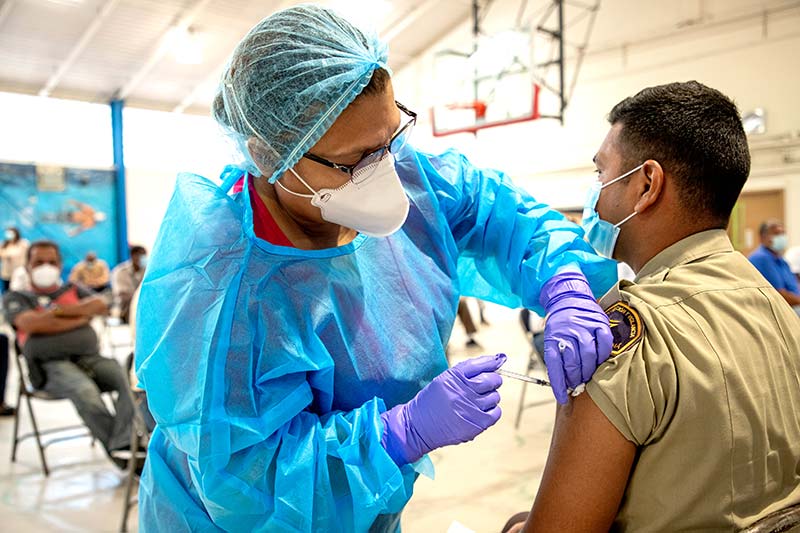Science is advancing rapidly. A year ago when the world had to stop and regroup to face the advance of the Covid-19 pandemic, few imagined that by this time, we would have a vaccine against the virus.
We had always heard that the development of a vaccine takes several years, even a decade, so the development and efficacy of an antidote against Covid-19 is truly innovative.
We had expected a scenario with a criterion of very high protection for severe disease and death, but low to moderate protection against the infection itself. However, “we now have very high protection for severe disease, as well as against infection,” explained Panamanian medical epidemiologist Arturo Rebollón.
Who is Arturo Rebollón?
– Panamanian physician graduated from the University of Panama specialized in epidemiology and public health research at the University of South Florida.
– Postgraduate professor in Clinical Research, Epidemiology and Primary Care. Author of multiple scientific publications and book chapters on indigenous maternal and child health, with his team at the University of South Florida.
– He is currently scientific advisor for cardiovascular health and diabetes for Central America and the Caribbean.
– After a year of uncertainty and measures aimed at mitigating the spread of the coronavirus, the world has embarked on a race in search of the so-called “herd immunity”, which is when more than 70% of the population has antibodies against a virus, either through vaccination or those that the body generates naturally when it recovers from the disease.
The physician indicated that after the first few months of vaccine application, the initial evidence is encouraging. “There are signs that the vaccine provides 90% complete protection; that means you don’t even get the virus. That’s where the evidence is moving towards.” Rebollón assured that the population can have confidence in the safety of vaccines that have been approved globally.
In order to generate that confidence, the medical specialist talked about some of the myths and realities of the Covid-19 vaccine.
Can those who have had Covid-19 with severe symptoms be vaccinated?
It is being recommended that they get vaccinated, but because they have antibodies, they can wait a little longer while countries stock up on the vaccines. Even the evidence is moving toward people who have already been affected only needing one dose because of the antibody load they already have.
Should people with diseases such as diabetes, hypertension and others be vaccinated?
These are precisely the first to be vaccinated because they are at high risk.
What about those who suffer from allergies to NSAIDs (aspirin, diclofenac or penicillin)?
They can also be vaccinated; they just have to notify at the time of vaccination and wait for a reaction; but the chances are remote, one in over 200,000 for severe reactions.
What are the most common side effects and how severe can they be?
They are very rare, but since it is an RNA vaccine, what it causes is a reaction at the injection site such as pain, swelling, some report fever and headache, but within 48 hours those symptoms should disappear by taking acetaminophen. It is important to keep in mind that we are not injecting genetic codes. It is a message that the body recognizes. There is no genetic code for the virus. The vaccine sends the message to generate proteins, but without getting into the genetic code.
Will it be necessary to be vaccinated every year as in the case of influenza?
It is not known, but initial evidence suggests that the antibodies last more than one year.
What about pregnant women or nursing mothers?
There are no studies yet, but international gynecological organizations recommend it from the third trimester of pregnancy onwards.
How come vaccines were developed so fast?
Nobody in the world should die when the technology exists. In this case, what happened for the development of the vaccines is that there was rapid international collaboration, as there had never been before:
– There was speed recruiting volunteers; a process that usually takes years was reduced to weeks.
– Also, messenger RNA technology allows the vaccine to be produced faster because it is more standardized.
– Another point was that the genetic sequence of the coronavirus was deciphered in January 2020, only weeks after the appearance of the virus, when this is something that used to take up to 10 years.
– So that combination of rapid recruitment of volunteers, increased production capacity and virus identification, plus billions of dollars, are reflections of science being put ahead of the curve.
What is the efficacy of vaccines against the new strains that have appeared?
It is still above 90% for serious diseases, but it drops a little for mild cases, up to 30%.
Even with the arrival of the vaccines, the Panamanian doctor made it clear that we are still far from claiming victory, so we must all maintain preventive measures and protect ourselves against the virus, mainly the use of mouth covers, which has also helped to reduce other respiratory viruses.
